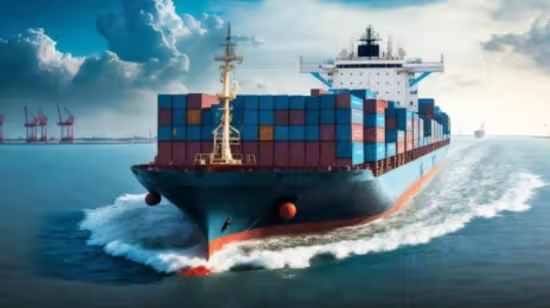
Free Download Maritime English - Operational Level for Ships Officers
Published 8/2025
MP4 | Video: h264, 1280x720 | Audio: AAC, 44.1 KHz, 2 Ch
Language: English | Duration: 8h 28m | Size: 5.63 GB
Standard Maritime Communication Phrases (SMCP), commonly used among Deck and Engineer Officers onboard ships
What you'll learn
Improve trainees' competence in Maritime English to the level required in the syllabus so that they can take effective and correct actions when ordered
Prepare trainees for developing the full knowledge, understanding and proficiency in Maritime English required by the STCW 1995 Code
Give students wide-ranging opportunities to practise communicating in English for both maritime and general purposes at lower intermediate language level
Communicate effectively and take actions confidently when ordered by senior officers in all shipboard operations mainly to maintain safety and security onboard
Requirements
Those who are able to use English for very basic, everyday needs but without sustained fluency and with many errors. Has a limited understanding of spoken English, requires a lot of rephrasing, repetition and simplification of language.
Those who can communicate satisfactorily about everyday topics with a restricted range of language. Able to understand native speakers of English talking at a measured pace with some rephrasing and repetition. Comprehension is likely to fail under pressure.
Those who are communicating about everyday topics and more abstract concepts. Makes some mistakes but is usually able to correct any major errors which prevent him being understood. Able to understand the essence of native speaker English but may misunderstand detail.
Those who are confident in using a wide range of language to express himself accurately and fluently in all but the most demanding situations. Makes some minor mistakes but these do not generally prevent him being understood. Experiences occasional problems of comprehension but these can usually be corrected
Those who are proficient in all aspects of communication. Has no difficulty with comprehension and can express abstract concepts accurately and fluently. Able to resolve any problems of comprehension effectively
Description
The International Maritime Organization (IMO), a sub organization of the United Nations, office based in London, with the responsibility for safety and security of shipping, proposed a common working language for shipping industry all over the world. As multi national crew were operating vessels, different languages were spoken onboard. In order to avoid accidents, learn safe working practices and various ship operating measures onboard, it was agreed to have a common language used onboard ships. Since 2001, IMO introduced Maritime English course mandatory for all seafarers and must follow a course to understand the shipboard operation activities in English. This was named as the common language onboard ships.Maritime English Operational Level course provides the ship's officers with the English language skills necessary for safe and efficient vessel operations at sea, collision prevention, pollution prevention, machinery operation, handling security matters, particularly at the officer level such as officer in charge of a navigational or engineering watch. This includes mastering Standard Maritime Communication Phrases (SMCP) and developing proficiency in both written and verbal communication for various shipboard situations, including emergencies.Proficiency in Maritime English is crucial for clear and unambiguous communication during critical situations like distress calls, search and rescue operations, and evacuations. It allows officers to understand and follow instructions, coordinate with other crew members and shore personnel, and maintain smooth operations among all departments. Maritime English is the universal language at sea, and this course ensures officers can effectively communicate with international crew members and other ships.Course consists of the following topics:-Introduction to Maritime English Operational LevelDescribe routine operations onboard and understand standard engine ordersExpress personal preferences, discuss food onboard, order mealsFood and drinks adjectives galley termsCommands in emergency situations OnboardCheck supplies; provide quantities, weights, prices discuss cargo handling proceduresCompare vessel details, describe equipmentDescribe visitors on boardDescribe weather conditions; understand forecastsReport events of past voyagesReport details of incidents at seaIncidents at sea, Ch.16 VHF communications for distress and urgency messagesPersonal injuries at sea. Request medical assistanceVHF communications regarding bunkeringExternal written and spoken communication systemsAll tenses in English Language used in Maritime EnglishList of Irregular verbs table, Present ,Past, Past participle tensesBunkering ChecklistReplacement for a Chief Cook due to ill health - Letter from MasterReporting an accident onboard - letter from Master to ownersCrew change request letter to owners10 questions to test your knowledge
Who this course is for
For experienced deck and engineering cadets working on merchant ships
For 3rd officers and 4th engineers working on merchant ships
for 2nd officers and 3rd engineers working on merchant ships
For chief officers and 2nd engineers working on merchant ships
For ETOs working on merchant ships
For Masters and chief engineers working on merchant ships
For Catering officers working on cruise ships
For all other merchant marine officers who are engaged in foreign going ships world wide
For all merchant marine officers working onboard tugs
Homepage
Code:
Bitte
Anmelden
oder
Registrieren
um Code Inhalt zu sehen!
Recommend Download Link Hight Speed | Please Say Thanks Keep Topic Live
Code:
Bitte
Anmelden
oder
Registrieren
um Code Inhalt zu sehen!